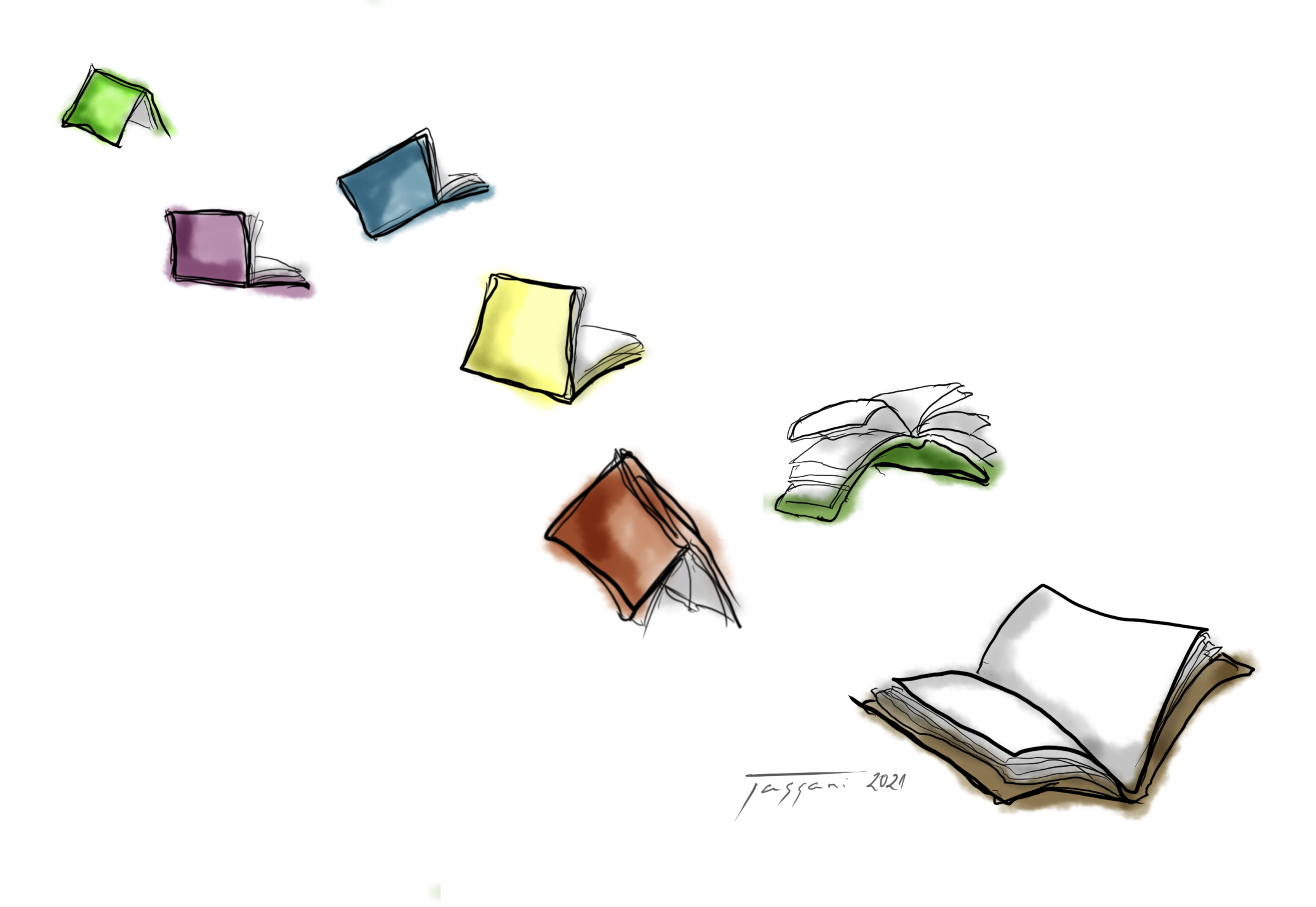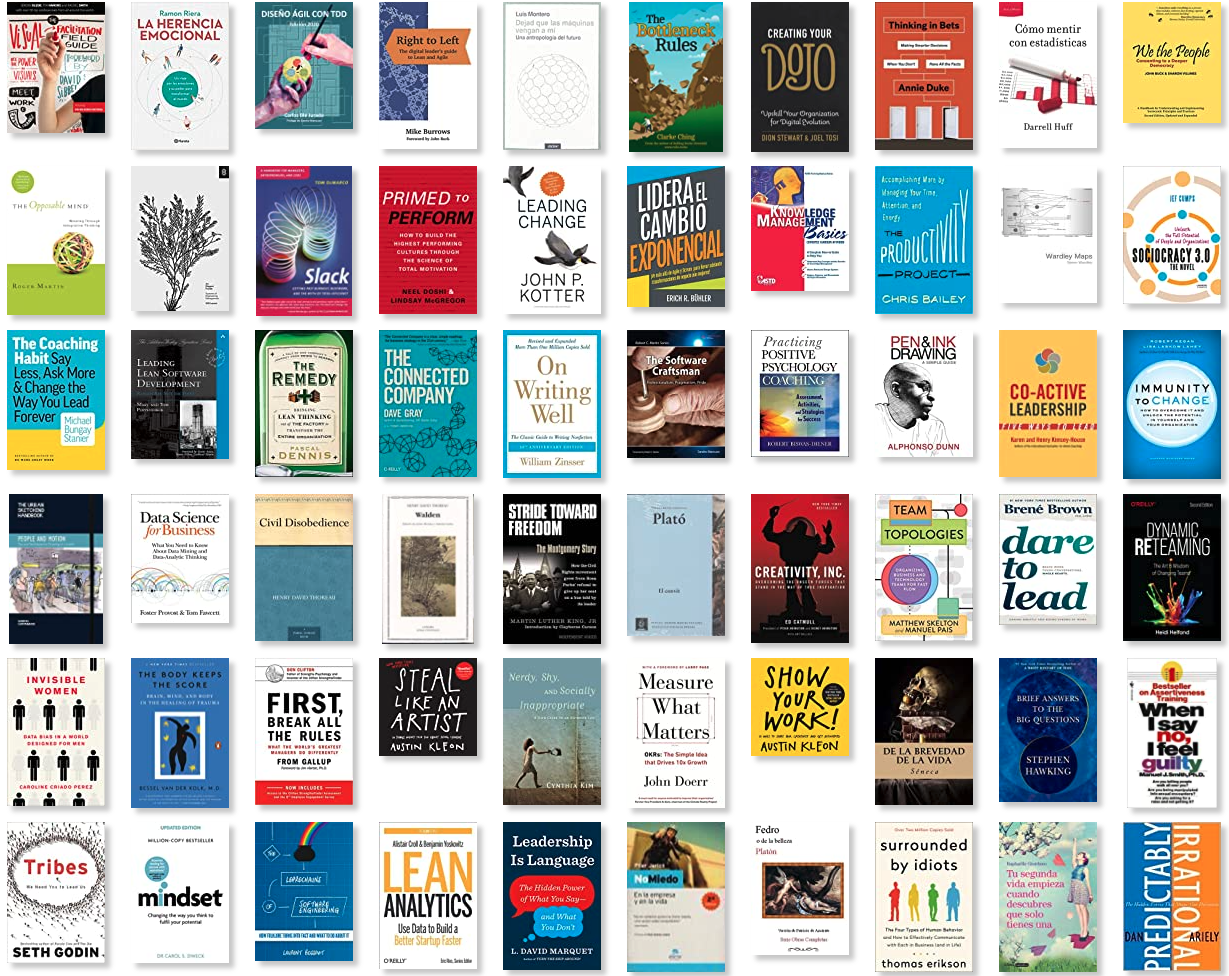Reading 60 books in one year
14 min read
I like reading books. In 2012 I started using websites to track what I was reading and connect with other readers. First I used LibraryThing and later Goodreads, and this last one allows you to define a reading challenge for the year and check progress on it. In 2017 I read 24 books, 31 in 2018 and 36 in 2019. I was basically reading books on topics related to work such as agile, psychology, culture or leadership, and I was happy with my reading record.
| Year | Challenge | Books |
|---|---|---|
| 2015 | No challenge | 9 |
| 2016 | No challenge | 19 |
| 2017 | 15 | 24 |
| 2018 | 18 | 31 |
| 2019 | 35 | 36 |
| 2020 | 60 | 60 |
I was not only reading the books but learning with them. In 2017 I was working with my friends Jaume Jornet and Pablo Domingo and they introduced me to the habit habit of taking notes and creating a summary at the end. We call it “closing the book”.
My colleague Richard Haywood told me he read 60 books in 2019. It meant more than one book a week and seemed impossible. With the pandemic and the lock down I was going to have plenty of time and I had a long list of books to read so I considered the idea.
Things I have learned
I finished 60 books in 2020 and I learnt a few things during the process. I think I learnt more things about myself than from books. Let’s look at them.
It can be done
I started the year with a Goodreads challenge similar to what I achieved the previous year, but lower: I wanted to read 24 books. The average for Goodreads’ users is above 40, but two books a month seemed reasonable. I have a long wish list and I had books bought and never started.
After the lockdown, having more time, I saw that I would reach that challenge sooner than expected and I increased it to 36, 3 books per month, looking at the number 60 as something unachievable. By summer, I told myself I wanted to read 60, but I did not dare to commit to that on Goodreads: I did not want to fail. I was telling myself that if I aspired to 60 but achieved 40 that was a success, but an inner voice had fear of failure. I was also conscious of the risk of picking shorter books and declining longer ones, even if they were more interesting.
My book selection was important to me, and keeping my reading practice: notes, summary, review… I will share my reading habit and tools I use on a future occasion.
When I started finishing a book every Sunday it was a relief: it was giving a rhythm and it was less hard to decide the next book to read as it was going to last only one week. It was also good to know that the next book was close.
I was finishing some books that had been on my wish list for years. Kindle, books bought long ago, buying used copies and borrowing books made the economic cost something not to worry about.
Maybe I was also lucky in my book selection, I found no “blocking book”, these books that make me hate reading. Fortunately, not in 2020.
It was in November when I said I was going to read 60 and I finished the 60th book on 31st December.
It is not a great idea
Some people claim you can read 200 books a year just by using less social-media [1]. I’ve also seen people giving tips for that challenge, including replacing books with audiobooks played at 1.5x [2]. If your objective is to read more books, these tips may work for you, but it is not my objective.
I enjoy reading books. I usually get satisfaction out of it. I enjoy understanding, learning, connecting ideas and sharing them. People I know with great ideas have built them on top of other ideas from books and I enjoy going to these sources. It’s clear to me why I read, an essential part to enjoy reading [3]. And it’s not about fast reading or taking shortcuts. I enjoy more “reading books” than “having books read”. It’s the journey, not only the destination.
The more I read, the more I enjoy… to a certain extent. Setting that challenge by the end of the year added stress to me, self-imposed stress. I started being obsessed with reading, usually during the weekend. I stopped doing other things I like because I had to be reading. It created an obligation in me that was uncomfortable. I was aware of the discomfort and I was considering failing on my challenge and achieving 58 or so books as a lesson to me: “you can fail, that’s not bad, and nevertheless you made that big amount of books”. But in the end, I did not allow myself to fail and I coped with the pressure, guilt and stress.
I am delighted with achieving my goal, and I acknowledge it was a bad idea. I want to read a lot, but I don’t need to read 200 books a year.
The sensation of reading the same book
During 2020 I had the sensation a few times that I had already read the book I was reading. Many books use the same examples and describe the same thesis just adding a small detail. That happens to me with some business books or books on organisational culture. Now I smile when I find yet another reference to W. E. Deming, W. L. Gore, Toyota, Tesla, Southwest Airlines, Semco, Patagonia, Ritz Hotels or Morningstar.
I also pay attention to the references at the end of the books. The ones that look so similar share many of them, and I have been adding them to my reading list, books like Mihaly Csikszentmihalyi’s Flow, Carol Dwek’s Mindset, Daniel Pink’s Drive or Robert Cialdini’s Influence.

To avoid having the sensation of reading the same book, apart from going to the original references, I added diversity to my reading list by accepting recommendations and balancing my different interests. I joined my company’s London Book Club and listened to other recommendations, added books on philosophy, drawing and coaching to the ones on culture, business and change.
Adding diversity to your reading list is good.
Everybody is selling something
Something I discovered in 2020 that may be obvious for many people is that everyone who gets a book published is selling something. It can be their company, their product or future consulting engagements. It can be their prestige or their clever idea, but they are looking for something.
There are many good ideas that are packaged in long books because they need to have a certain length to have a reasonable price tag. And there are books that seem so similar that you don’t know what’s the difference: The Power of Habit, Tiny Habits, Atomic Habits, …
Well, I may be overgeneralising, but thinking this way helps me taking all the books with a pinch of salt. Being conscious that the author may be selling a partial picture and they may not even be aware of that.
I may be influenced by the reputation of an author or other myths about brands or countries. I have to be aware of it and keep my critic awake.
It depends on your context
We can read the same words and understand different things. A fragment may evoke a past experience for you and it can be boring to me. A book may be transformational to me because it builds on top of something I have learnt and it may have no effect on you.
The effect of a book, or any other experience, depends on the context you have when reading it, the environment and surroundings, your living conditions and your previous experience. It is very hard to recommend a book.
Combine reading with other activities
If my purpose is learning, reading is only one way of achieving it and dedicating all my time only to reading would be a bad idea. In 2020 I also started to listen to podcasts, to take care of my health working out, to keep up with my mental health by doing meditation with the support of some apps and I even joined the Advent of Code, a challenge to solve coding problems on daily basis from 1st December to 25th December, adding more stress to my Christmas time.
I joined some virtual conferences as well, but by the end of the year, I realised that they were not working for me.
Books are only one aspect of learning and it’s good to add variety.
What I did well
I enjoyed most of the books I read last year. I was keeping my discipline of learning and keeping my reading habit intact. It was good to start reading some philosophy books. I joined a reading club and enjoyed sharing my interests. I was also influenced by other recommendations that I am grateful to. I did not buy any book that was not read during the year and cleaned part of my “to read” list. In the past, it was usual for me to buy books immediately after they were recommended and last year I succeeded in buying “just in time”. Japanese people have a word for piling up books without reading them, tsundoku [4]. When you buy a book you don’t buy the time for reading it.
I was also conscious of my mental commitment to read books. I’ve seen Goodread users who read a couple of books per month and add four to their “to read” list in the same period. I keep my reading radar as clean and prioritised as I can.

What I will do differently
I don’t want to read from a sense of obligation. I want to read more classics and literature. I want to read novels and science fiction or fantasy books. I want to read not only in English but also in Spanish and Catalan. I want to re-read books. I want to be able to drop a book I am not liking. I want to digest what I read, to reflect on it. I may want to read less.
In 2021 I want to enjoy reading2.
Toni Tassani — 2 May 2022
This article was originally published on 29 March 2021 on the company intranet.